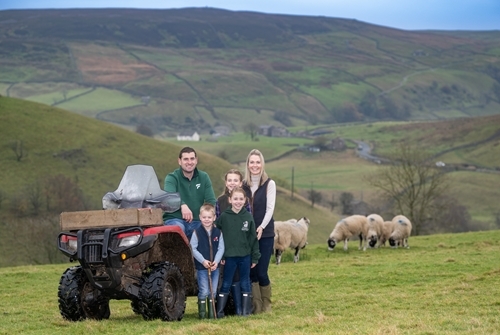
The newly launched Wensleydale & Swaledale Environmental Farmers (SWEF) Group has won a £100,000 National Lottery Heritage Fund (NLHF) bid to fund the development of the group and its catchment-scale conservation ambitions.
The farmer-led cooperative represents a great opportunity for the 133 farmers who have expressed interest in joining. Their farms cover 54,000ha which is 65% of the land area within Swaledale and Wensleydale, giving SWEF the potential to deliver its central aims of biodiversity restoration, clean water and CO2 net zero on a landscape scale. The model will generate income from private natural capital markets to ensure the long-term success of the group and positive environmental change for this iconic area.
Mark Willoughby local tenant farmer and chair of SWEF said:
“Thanks to National Lottery players, we are delighted to receive this award and recognition that farmers play a central role in creating and maintaining our iconic Dales landscapes. It’s essential that environmental improvement goes hand in hand with food production and with the loss of £10million in subsidies from the area, farmers will need to find alternative revenue streams. Emerging natural capital markets are a potential new source of income, but they are difficult for individuals to navigate alone. SWEF’s cooperative model provides an assured trading platform that reduces risk and operates at a scale that offers much bigger opportunities.”
The Heritage Fund grant has enabled the appointment of project officer Emma Orde-Powlett who will work with the group to implement a catchment-scale conservation plan based on ecological assessments of its members’ land holdings. This will enable SWEF to establish a wide range of farmer-led initiatives aimed at protecting and improving important habitats and populations of threatened wildlife, such as curlew, golden plover, hen harrier, merlin, red squirrel and Atlantic salmon, for which the Dales are famous. It will also incorporate projects to repair stone walls, haybarns and sheep folds and improve water quality in the Ure and Swale river catchments, and reduce flooding through its Water Restoration Fund.
Mark continued:
“I strongly believe that a conservation plan, designed by SWEF farmers, local Estates, and land managers, can be more effective at delivering environmental outcomes and better value for money than a top-down approach. We have the knowledge and expertise to maintain and enhance our rich environmental and cultural heritage.”
As part of the culture and community aspect of SWEF’s project supported by the Heritage Fund, a series of ‘living history’ films will record the stories of farmers from the area. Much of the local heritage is held in the oral traditions of the two dales. The living histories project will record these traditions for posterity and chronicle the changes in farming life from the different world of their grandparents to today’s reality where many small family farmers have to take on other jobs to make ends meet.
Swaledale farmer and SWEF board member Linda Rukin said:
“I would urge all farmers who have so far expressed an interest in SWEF to join as full members, not only to benefit from accessing natural capital markets, but also to share resources and gain a stronger voice to ensure the continuance of our cultural heritage and communities. SWEF offers farming families an opportunity to help secure a sustainable future.”
Once its conservation plan is in place, SWEF aims to secure funding for restoration projects through a blend of public and private finance including sponsorship, Biodiversity Net Gain (BNG) and corporate Environment Social Governance (ESG) investment. The cooperative’s partnership with the UK’s leading wildlife research charity Game & Wildlife Conservation Trust (GWCT) guarantees both farmers and investors verifiable delivery. The GWCT’s subsidiary Natural Capital Advisory (NCA) will carry out the environmental monitoring, guaranteeing the highest level of assurance and offering natural capital investors a single point of contact.
GWCT chief executive Teresa Dent CBE convenes the SWEF steering group. She said:
“SWEF and its sister cooperatives Peakland Environmental Farmers (PEF) and the Environmental Farmers Group (EFG) form a ground-breaking farmer-led nature recovery movement. Combined they now represent 687 farmers covering 354,436 hectares or 875,830 acres.
“With 72% of UK land in farming it is vital to engage and support the private land managers or Working Conservationists who run it. Nature reserves are important but not sufficient on their own. Bringing farmers on board and paying fairly for environmental goods they can supply through a blend of private and public funding is the only way the Government will be able to hit its legally binding targets for nature recovery alongside its food security goals.”
Notes for editors:
